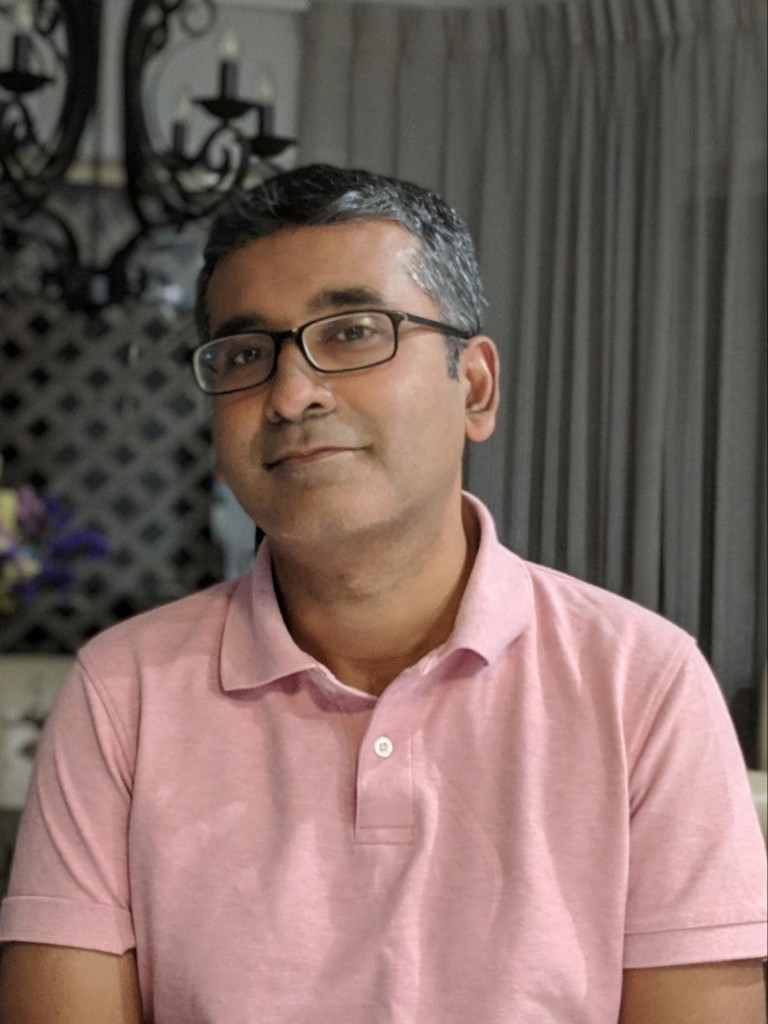Many of us will argue that, at the end of the day, the only thing that truly matters to all of us is our health. How can we take care of our health as we, as a population, are increasingly living longer? According to the Australian Institute of Health and Welfare, “The Australian population is ageing, with older Australians a growing proportion of the total population. In 2017, 15% of Australians (3.8 million) were aged 65 and over; this proportion is projected to grow steadily over the coming decades”.
For this issue of the Echos’ newsletter, I had the utmost pleasure of speaking to Dr Asif Saber – who is a Specialist in Geriatric Medicine at the Western Sydney Local Health District – about health, ageing and innovation in the Australian health sector.
Dr Asif Saber
RG – Asif, could you please tell our readers a little bit about yourself?
AS – I was born in Bangladesh but lived in Thailand and Saudi Arabia before moving to Australia in my teens. As I have grown up in many diverse cultures, I have always enjoyed learning about other countries. My passions are travel, photography, and football. I studied medicine at UNSW and have spent most of my working life as a doctor at Westmead Hospital in Sydney’s west. The most important thing in my profession is to never stop learning and be prepared to try many different ways of doing things. We face many challenges in the medical profession today. I think we can learn a lot from our colleagues around the world as we all face the same challenges, but I also think that we can learn from other industries. The aviation industry, with its focus on safety, and the hospitality industry, with its emphasis on customer experience, are two wonderful sources of inspiration.
“When we think about Design Thinking, we often think about the consumer. However, I think this is an approach that can help our employees as well. Like a lot of industries, we are going through rapid change, and this can really make employees feel very unsettled.”
RG – Your multiculturalism shows in the way you look at learning. You are a doctor specialised in geriatrics. What does that entail on a daily basis?
AS – I am involved in the care of elderly patients. This can be quite challenging as our patients present with multiple problems simultaneously, and they have to be viewed in a holistic way. You cannot take a one-size fits all approach but have to balance a lot of medical, psychological and social factors to come up with the best solution for the patients. I also help manage some of the community-based teams within our department. The nature of our work means a lot of the services are delivered in people’s homes rather than in hospital. It’s quite an exciting area to be involved in as there is an increasing need for home-based healthcare and interventions. When we think about Design Thinking, we often think about the consumer. However, I think this is an approach that can help our employees as well. Like a lot of industries, we are going through rapid change, and this can really make employees feel very unsettled. I think it is really important to understand what makes people tick and setting up work in a way that is satisfying, efficient and meaningful.
RG – How would you describe the health sector in Australia as it is today?
AS – Compared to most countries, the public health system in Australia provides quite a comprehensive range of services to its citizens. There is also a thriving private health system here, but it tends to focus on the relatively healthier section of the population. The strength of our system is that people get universal access to essential health services, and this means that patients are unlikely to die because of lack of access to essential treatments and medicines. However, there remains enormous room for improvement. The quality of care remains a concern in a wide variety of settings, and patients can find it difficult to access services when they most need it. As a result, the patient experience of healthcare can be quite negative.
RG – Do you think the health sector is changing in this country?
AS – The cost of providing such a comprehensive service is always growing, and like a lot of advanced countries, Australia needs to work out how to maintain this standard into the future. One of the key drivers of this is the ageing population. Diseases are also increasingly chronic in nature, with patients and their families having to live with their illness for a lifetime. As a result, there is increasing emphasis on wellness and quality of life as opposed to simply living longer.
“We don’t have a magic pill for the problems of old age, so the solutions will not come from technology but from human-centred approaches to addressing the needs of our patient.”
RG – In your opinion, why is innovation important in your field of work? What motivated you to learn a new approach for innovation?
AS – Although we have more technology and resources than ever before, people are increasingly dissatisfied with their health. The major problems in our patient cohort include memory loss, falls and fractures, pain and difficulty moving. We don’t have a magic pill for the problems of old age, so the solutions will not come from technology but from human-centred approaches to addressing the needs of our patient.
RG – You have attended Echos’ Design Thinking Experience course. How do you think the knowledge you brought back to your company can positively impact your industry?
AS – I think the Design Thinking approach complements our philosophy of patient centred care. In many areas of medicine, the main aim of care is to administer the “right” medicine or carry out the “right” operation regardless of what the implications may be for the patient. I believe these treatments are only a means to an end, which is to improve the health of the patient and restore the patient’s function. The approach and techniques I learnt at Echos help to provide a systematic approach to dealing with the problems I have described previously.
“You don’t need to wait for all the stars to align before you can start this process. In fact, learning by doing is the most useful attitude you take on this journey. Trying innovative solutions will automatically allow you to discover new ways of looking at your problem.”
RG – It is refreshing to hear a physician say that patient health is the ultimate goal during treatment. What were your biggest learnings during Echos’ Design Thinking course? Did you learn anything new about yourself?
AS – You don’t need to wait for all the stars to align before you can start this process. In fact, learning by doing is the most useful attitude you take on this journey. Trying innovative solutions will automatically allow you to discover new ways of looking at your problem. Like many in my profession, I tend to be a perfectionist and spend hours dreaming up the perfect solution before putting it into practice. From this course, I learnt that we don’t have to get it right first time and that it takes several goes to find the right solution. That’s a very liberating thought.
RG – Realising it is ok to make mistakes is indeed very freeing. Are you currently working on a project and using Design Thinking methodologies?
AS – I am starting to introduce the idea to my colleagues, so I have not started working on any specific project yet. I spend a lot of time looking at processes to ensure that the patient journey through the hospital is as smooth as possible. To do that, different members of the team need to work together in unison. We need to be able to anticipate the patient’s needs, but we also need to understand why people work the way they do. So I think this is a good place to start the Design Thinking journey.
“Don’t assume anything. Try to come up with as many ways of looking at your problem as you can. Then look at ways of proving or disproving your suspicions. Talking to real people is the best way of doing this.”
RG – You’re absolutely correct. What pearls of wisdom would you share with someone who is starting their innovation journey through Design Thinking?
AS – Don’t assume anything. Try to come up with as many ways of looking at your problem as you can. Then look at ways of proving or disproving your suspicions. Talking to real people is the best way of doing this. Putting strict time limits on our Design Thinking projects was really useful. It’s amazing what you can come up with when you have got a tight timeline and a great team!
RG – Committed people can conquer anything, I couldn’t agree more. Do you have any other thoughts you’d like to share about your experience?
AS – I really enjoyed the experience. It was great working with such a diverse and passionate group of people. I also enjoyed going out of my comfort zone and learning by doing totally new things.
RG – Truly glad you enjoyed it. To finalise, could you please share a quote that inspires you?
AS – “I make more mistakes than anyone else I know. Sooner or later, I end up patenting them”, from Thomas Edison – who else?
RG – Thank you so much, Asif. It was such a pleasure to speak with you.
AS – Thank you.
—
Follow us on social
Instagram – Facebook – LinkedIn – Youtube
How Can We Help?
- For training and Innovation Journeys in your company: check out our in-house course offering.
- For upcoming courses in your region: visit our website.
- For upcoming events in your region: look at our event calendar.
- If you have a special project and would like to use Echos’ consultancy services: send us an email.
- Want to speak to a real person? Call us on 1300 502 006



